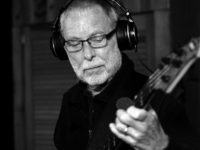For me, Dave Holland is one of those guys who has stood for excellence in almost four decades of recording, dating back to the In A Silent Way recordings and before. Yup, it’s time to devote space giving him mad props. Put on your raincoat and rain boots, ‘cos I’m gettin’ ready to slobber and gush.
In My Humble Opinion, Dave has hit nothing less than doubles or triples since his first time at bat with the 1973 whack jazz masterwork Conference of The Birds. And every album since the current Quintet’s first one, 1997’s Points Of View, has been knocked out of the park.
For the last ten years, DH has employed a pianoless quintet, substituting the vibes of Steve Nelson instead. Also for this record, Billy Kilson provides the percussion, while the horn section is manned by Robin Eubanks on trombone and Chris Potter on saxes. Robin is the brother of the Tonight Show bandleader/guitarist Kevin (who had also appeared on a DH album) and Chris Potter is currently about the hottest young tenorman in NYC after his work with Steely Dan on Two Against Nature.
As for the leader, Dave Holland’s bass is always a thing of beauty; a student of the legendary Ray Brown, the Brit brings Brown’s perfect sense of note placement along with Charlie Haden’s lyricism. And while he’s not a show off, Dave’s finger speed and suppleness is second to none. He really is the Complete Double Bassist.
It’s that suppleness that serves him well for the challenging settings he often sets up for himself and his band. For while he’s well beyond his whack jazz days of the early 70’s, Holland hadn’t stopped pushing the boundaries of acoustic jazz, a tough proposition when it seems there are few stones left unturned in that arena.
Just as he did so masterfully in Conference of The Birds, Holland makes his two horn players play with, against and around each other. When their not competing, they’ll blurt out a recognizable theme usually near the beginning and a couple of times afterwards between solos. The warmth of the vibes serves to temper the sound of those kinetic horns. The drummer is tasked to regulating the ever-changing pace of the song.
The interplay among all members is often intricate to the extreme (which also makes it a hell of a lot of fun to listen to closely).
In short, you can’t be a slouch in Dave’s band.
The other trademark of DHQ’s sound is the songs and how they are treated. Every one has discernable melodies and are more written out than just a handful of chords to vamp on. But the band often diverts from the main melody just enough to allow for stretching out but never so much so that you lose your sense of where you are in the song. It’s a balancing act that few others can pull so well off these days, much less try.
Of the batch of records the DHQ have released since 1997, Prime Directive from 1999 is the one I’m taking to that desert island. Since they are all very consistent it really comes down to the material and how it strikes you.
On this record, each song is especially distinctive from each other, possessing unique personalities of their own. It starts with the busy, uptempo Prime Directive, a great showcase for those battling horns. Looking Up, despite the title, has a melancholy feel, and features some nice ‘bone work from Eubanks. The mood turns even more somber on Make Believe with a very believable mournful solo by Potter. Caribbean flavored percussion with Chris Potter’s sax starts off A Seeking Spirit, which is highlighted by Kilson’s explosive drum solo.
Potter’s composition High Wire is more in the straight hard bop side, while Jugglers Parade is paced by an odd “juggling” time signature. Holland switches to cello for the solemn Candlelight Vigil, where Eubanks’ bluesy side is featured.
With Wonders Never Cease being the longest track and a having a highly developed melody, it is the closest thing to being the epic track of this collection. It begins with Holland plucking out a dark, forboding solo before the song actually commences at around the 1:20 mark.
Even though it was written by Kilson the track provides an excellent example of Holland’s ability as a leader for letting a composition reveal itself at its own pace and giving all the soloists plenty of space within it without losing sight of the main melodic line. Nelson shines in his featured spot and then everyone steps aside while Potter and Eubanks perform simultaneous solos for a couple of minutes; it makes for an incredibly engaging moment. After Kilson has his moment in the sun, the theme is stated again and as the song is wrapped up you find it difficult to believe it’s nearly 14 minutes long.
The brief Down Time is just Holland, Kilson and Eubanks and serves as an amiable vehicle for Eubank’s muted trombone. An appropriate “wind down” tune to finish out an album full of active moments.
And in case you’re wondering how well the quintet can replicate the magic live, just sample Extended Play: Live at Birdland for proof that these guys can pull it off in front of an audience. So, is the DHQ the best combo in jazz? If challenging, fresh straight ahead jazz played at the highest level of musicianship is your thing, you’d might say “yes”. Maybe even “hell yeah!”.
- Rich Halley 4 – ‘Dusk And Dawn’ (2024) - November 13, 2024
- Vazesh [Lloyd Swanton, Jeremy Rose + Hamed Sadeghi] – ‘Tapestry’ (2024) - November 12, 2024
- Keith Jarrett, Gary Peacock + Paul Motian – ‘The Old Country’ (1992; 2024 release) - November 7, 2024



